
- Home
- About Us
- Sustainability
- Investors
- News
- People & Culture
-
Regions
We live in an era of rapid change and constant ripple effects which are a result of a new way of thinking and doing. We live in an era of opportunity, where almost anything we think of can probably be done. If we can’t get it done in the physical world, technology enables us to make it happen in the digital world. What was unthinkable yesterday becomes the norm tomorrow, and just as we begin to get comfortable, another brilliant mind brings an idea to life and reminds us that technology (and the world) is exponential.
Since the partnership launched, almost 6 million people have registered to make use of these financial products.
Who would have thought that the invention of mobile phones would lead to something other than mere convenience? That an icon or a string of numbers on a phone could impact an entire population? When mobile money was invented, it created more than convenience for people who couldn’t get to a bank. It created financial inclusion for millions of unbanked people.
To get the best benefits out of financial inclusion, financial literacy is essential. The Financial Educators Council defines financial literacy as “possessing the skills and knowledge on financial matters to confidently take effective action that best fulfils an individual’s personal, family and global community goals.” A report from the Punjabi University Patiala in India entitled Financial Literacy for Developing Countries in Africa details how being financially literate can contribute to improving socio-economic wellbeing, reduce poverty and promote sustainable growth. Simply put, financial literacy enables individuals to make good decisions about money in their personal and professional lives. For an individual who previously had no access to financial products and services, making good financial decisions can be incredibly challenging. However, because we live in a digital (and exponential) world, learning and understanding new concepts happens at a faster pace, often in a ‘hands-on’ environment. People in Africa who previously had limited or no access to financial products are becoming financially literate in a very hands-on way, thanks to the rise of mobile money and the world of financial services it offers.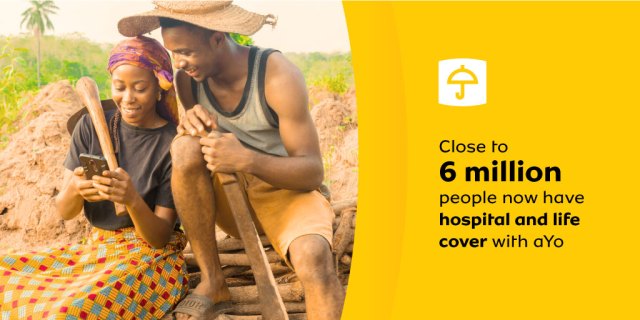
Aside from being able to safely store and save money, mobile money provides access to life cover and hospital insurance. MTN and MTN Mobile Money partnered with Momentum Metropolitan Holdings to form aYo, a company that provides hospital and life cover to subscribers through their phones. Since the partnership launched, almost 6 million people have registered to make use of these financial products. This means almost 6 million registered customers are actively planning and thinking about their financial future in the event of unforeseen circumstances – an essential factor in responsible financial planning.
The ability to save funds and sign up for insurance products is only the beginning of what’s possible in the world of Mobile Money. Considering how quickly an idea can become a reality in the digital world, we might soon see the day when Mobile Money users have access to all the same products and opportunities offered to those who use traditional financial services. When that day comes, people in Africa will be ready, armed with a comprehensive understanding of mobile financial services.
It has also made the world smaller. If you want to know what a day in the life of a New Yorker looks like, you’ll find countless videos and stories aside from what blockbuster movie producers want you to see. If friends have moved abroad, making a phone call to their new country for a catch-up doesn’t need to leave you with a big bill. Wish your local mall stocked the jeans you saw in that New Yorker’s Instagram video? Just order it online and it will arrive while the brand is still trending. Technology brings overseas closer to home, wherever you are in the world. Aside from the little conveniences technology provides, a digital and mobile world is one where people are enjoying major benefits. One of those benefits is the ability to support families, conduct business and offer financial aid from one continent to another. It started with mobile money, and has evolved into a service called MTN Homeland.
MTN Homeland is one example of how performing such transactions is so much easier because of mobile technology.
We live in an era of immigration. It is so common to find people packing their bags and leaving their home countries to start a new life and career somewhere else, for all sorts of reasons. Leaving doesn’t always mean never looking back, and for millions of people who leave the African continent, leaving often means creating a better life for those they left behind in the first place. Job opportunities with higher salaries is a common cause for immigration, and those who take these opportunities often have a family who sacrificed and worked hard to get them there. In turn, the families left behind rely on the person who left, to send money home. In the past, sending money home involved a great deal of admin and the means to physically travel to a facility which enables international financial transactions. MTN Homeland is one example of how performing such transactions is so much easier because of mobile technology. So easy, that neither the sender nor receiver need to leave their home to complete the transaction.
People living in the United Kingdom, as well as EU residents, simply register online and provide verification documents. The verification process takes around one hour, and thereafter, money or airtime can be sent to an MTN Mobile Money user living in Africa within minutes. Currently, money transfers can be sent to seven different African countries, while airtime can be sent to 14 African countries and three Middle Eastern countries. As the service takes off, these numbers are set to grow.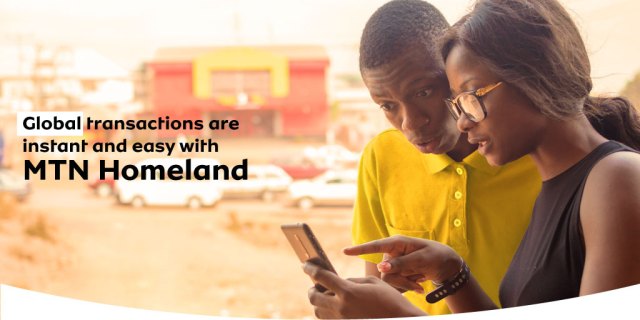
A flat rate of €4 is charged per transfer, which costs less than the average London pub meal. Sending airtime is completely free, so users only pay for the value of the airtime. As long as the receiver has an MTN Mobile Money account, they can get access to the money minutes after it is sent, and visit more than half a million MTN Mobile Money agents to turn those digital funds into physical cash.
For people who send money back home every month, the time and effort saved is a small convenience compared to the assurance that their funds reached their families in time and safely. With a mobile phone and the connectivity to transact, individuals across the world become so much more empowered. And with more people empowered, consider all the possibilities we haven’t even begun to imagine…
Download MTN Homeland via the Google play and iPhone app stores.
The rapid pace at which we adopt new ways of solving challenges is incredible. It seems that humanity is becoming accustomed to change, even expecting it and often demanding it when the status quo doesn’t seem good enough. Our world is one where actions are quick, and lessons are learned along the way. The global icons of today, like Mark Zuckerberg, are telling us to “move fast and break things. Unless you are breaking stuff, you aren’t moving fast enough.” The world of finance is not immune to this rapid change, with technology as a foundation for new solutions and a continent full of people who are ready and willing to make use of them.
A high demand for mobile money has also led to job creation, with more than 400 000 jobs created because of MTN Mobile Money.
In Africa, it is easier to find someone with a mobile phone than it is to find someone with a traditional bank account. Access to traditional banking does not come easy for many Africans, but a mobile phone can be purchased in minutes. This is why mobile money has become the norm. The media is even reporting that mobile phones are replacing bank accounts in Africa, with sub-Saharan Africa boasting the highest number of mobile money accounts in the world. A high demand for mobile money has also led to job creation, with more than 400 000 jobs created because of MTN Mobile Money.
While nations on other continents look to cryptocurrency and improvements of real-time payments for a financial revolution, Africa is taking the mobile route. The Brookings Institution published a report about Africa’s consumer marketing potential, which considers the continent as among the fastest-growing consumer markets in the world. As more people in Africa move to big cities, consumer spending from businesses and households increases. The report notes that the largest 18 cities in Africa could have the combined spending power of US $1.3 trillion by 2030, according to the Economist Intelligence Unit.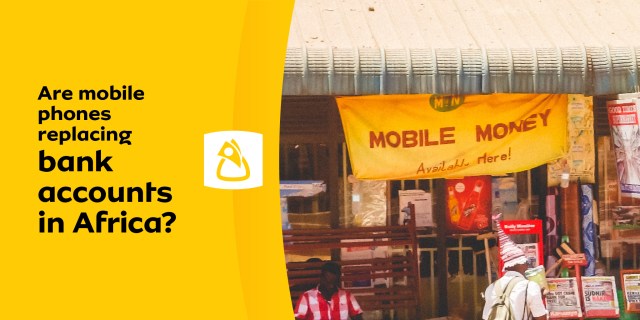
As connectivity becomes the norm on the continent, so does the adoption of technology. The Brookings Report acknowledges that Africa is the fastest growing mobile telecom market in the world, and that connectivity has surpassed 80% in many countries. Over the last 25 years MTN has built high-speed networks covering 560 million people. This combination of increased connectivity and adoption of mobile technology makes mobile money the ideal tool in Africa’s own financial revolution.
Access to technology provides new opportunities for consumers in Africa to spend their money, and for African business owners to sell more products and services. In 2017, Africa’s e-commerce market was valued at US $5.7 billion – a number which increases as the number of people with access to the internet grows. In parts of the continent where a variety of physical shops are available, e-commerce fills that gap. Where customers are limited by physical distance, entrepreneurs use e-commerce to grow their customer base.
A quick google search will reveal countless online stores with roots in Africa. A walk through the streets of one of our buzzing cities will reveal that the person who sold bread and milk yesterday is now also a mobile money vendor. A trip on a bus to a remote village reveals passengers living their modern connected lives on their mobile phones. The change in Africa is palpable, and we welcome it.
Technology has proven itself to be many things; a tool to create solutions to age-old problems, an opportunity to be more efficient and impactful, a foundation for an entire digital world that brings people closer together. Technology can also be an equalizer. In the digital world, it doesn’t matter whether you’re connecting from a mansion or from a community centre – opportunities to create are available for everyone, as long as you have that connection. This is why innovation coming from a small remote village can be as significant as innovation coming out of Silicon Valley.
Young Africans are solving problems in a way which proves that ideas, innovation and technology are good together.
People in Africa have taken the opportunities provided by technology and the digital world it powers, to ensure that the continent will not be left behind in the digital revolution. Young Africans are solving problems in a way which proves that ideas, innovation and technology are good together.
As connectivity continues to improve across the continent, so do the opportunities for people in Africa who want to contribute to the digital world. In South Africa, MTN has sponsored the App of the Year Awards since 2012, which sees a growing number of entries every year. The twelve categories include Best Health Solution, Best Women in STEM (Science, Technology, Engineering and Math), Best Consumer Solution and Best Financial Solution. The winning apps are on par with those developed in the innovation hubs of the world. In 2019, the Overall App of the Year Award went to Naked Insurance, which uses cutting-edge artificial intelligence and chatbots to give consumers insurance cover at the touch of a smart-screen in under three minutes. Apps of this calibre are not gimmicks or novelties, but concrete solutions to real challenges that real people face in their everyday operations.
Across the continent, digital innovation is encouraged, with stakeholders ranging from schools, Governments and NGOs working together to prepare young people for the future world of work by helping them to acquire digital skills. To ensure that youth in Nigeria are employable in the future, the government has begun to introduce coding and software development in primary schools. Youth in Ghana also recently started coding at school level, with the government ensuring teachers are properly trained and sponsors like MTN Ghana providing the necessary resources.
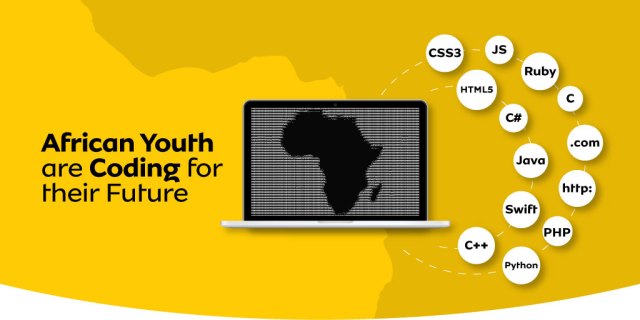
For those who finish school with a sound understanding of coding, the future is bright with opportunity to create solutions which can change the world. Open source or public Application User Interface (API’s) become available online all the time, making it easier for developers to bring their ideas to life. MTN’s own Fintech API portal is currently used by more than 3700 developers across Africa. The portal encourages independent developers, start-ups and enterprises to make use of these API’s to solve problems that are relevant to Africa, and create solutions which work in Africa. This means more opportunities for African innovators to wow the world with new solutions.
It doesn’t matter whether a digital solution launches from a boardroom in Berlin or a university in Accra. If that solution solves a problem, it is likely going to secure the future of the person who created it. With an internet connection, an open API and a good idea, African coders are set to thrive in the digital world.
Today, potential customers and collaborators are just as likely to ask for your Instagram handle as they are to ask for your business card. Even if the products or services offered have nothing to do with the digital world, an online presence is expected. As access to the internet grows across the continent, more African entrepreneurs are able to bring their businesses online. The benefits of a connected continent are far reaching, making a positive impact on more than 4 million SMEs and the people who rely on these small businesses to make a living.
We’ve even started to provide micro-loans to help grow small businesses on the continent
If nobody knows about your business, nobody can support it. Our current world is one where word gets around digitally, and at an alarmingly fast pace. Digital marketing is essential in building a brand and growing a customer base. A mix of paid advertising and social media content can be used in powerful ways, and African businesses are finding new ways to grab customer attention every day. Content is king when it comes to marketing a brand online, and budgets to create content needn’t be large when the idea is unique or attention grabbing. Digital Odyssey recently rounded up a few viral marketing campaigns which came straight out of Africa, and we expect to see much more in the next few years as connectivity on the continent increases.
We’ve spoken at length of the benefits of Mobile Money for African businesses in previous Spotlights, and none of those benefits would be accessible if it wasn’t for connectivity. SMEs that accept Mobile Money payments for their products and services are gaining more customers – those who don’t have access to traditional financial services. For entrepreneurs who want to reach customers beyond physical borders, connectivity creates the opportunity to build online stores and brings an e-commerce element to African businesses.
Finding investors is easier today than it has ever been. Sending pitch documents, setting up crowdfunding pages and hosting meetings online are all possible because of connectivity. African businesses or entrepreneurs with lucrative ideas aren’t limited to the people in their physical surroundings as a source of funding when their online presence is comprehensive.
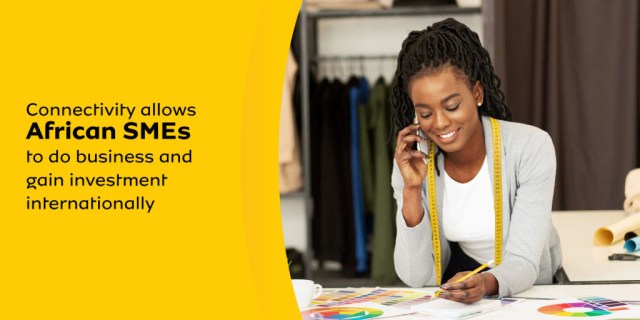 Connectivity Enables a Successful Future
Connectivity Enables a Successful FutureSchool-aged learners are encouraged to become entrepreneurs when they leave school, and being digitally savvy will give these learners a necessary edge to compete with global players. Access to technology is essential for African youth who want to be entrepreneurs, so we’ve donated more than 925 multi-media centres and digital classrooms to schools across 12 of our markets. By doing so, we are equipping our youth for a successful future and the opportunity to become competitive on a global scale.
A connected device makes the world more accessible and sets ideas in motion. If you have a business idea, the internet is your resource library to ensure your idea is truly unique. If you have a product to sell, the internet becomes your sales platform, and your target market can be global. If your idea requires funding, the internet is your tool to find the right investors. In Africa, the opportunities the internet provides are grabbed with both hands, taking the continent several steps closer to becoming the next economic giant. Small businesses can reach large markets, while consumers who were previously not prioritized finally have the luxury of choice and variety.
Mobile operators like us are providing connectivity to 560 million people on the continent.
A vast terrain and countless small villages means that physical access to a variety of stores is not realistic for many people living in Africa. The rise of e-commerce brings that variety closer to consumers who live in remote areas. In an article for Mckinsey about how e-commerce supports African business growth, the co-CEO of Jumia, Sacha Poignonnec, notes that a lot of their consumers live in small villages and cities outside of the typical metropolitan areas.
While e-commerce provides more choice and accessibility to African consumers, business owners on the continent are able to expand their reach. Internet coverage continues to grow, with mobile operators like us providing connectivity to 560 million people on the continent. Entrepreneurs with brick and mortar shops are able to add a digital element to their businesses at a fraction of the cost of purchasing a new physical property. With a wider audience available online, more products can be sold and small businesses can grow to employ more people.
Tech Hubs are Popping up in Africa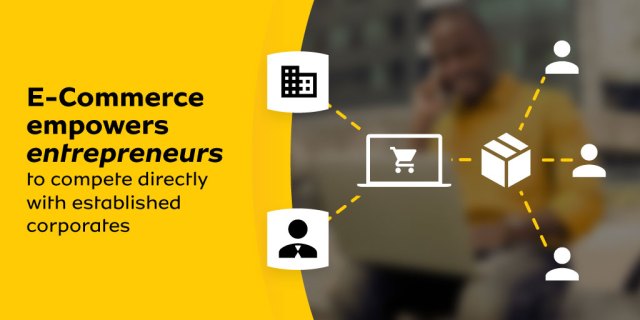
As connectivity becomes more accessible, so does the potential to create tech hubs in Africa. South Africa’s Silicon Cape has become an enabler for tech related start-ups in the country’s capital city of Cape Town. Small businesses with big ideas are given the platform to connect with investors and use funding to turn their ideas into global solutions.
Ghana’s Silicon Valley has the world looking in the direction of Africa for the next big tech-hub. Their innovation centres not only enable research and education in the fields of Science, Technology, Engineering and Maths (STEM), they are also spaces for product development. Their website describes the innovation centres as spaces which will allow “a strong industry and university research collaboration to develop enhanced products that will make Ghana the envy of Africa for innovation…” Silicon Valley of Ghana recently hosted the largest hackathon in West Africa, where 600 students were trained in software development. With more tech-related training taking place, more opportunities to create jobs and new careers become available.
As people in Africa get access to the internet, the opportunities for people in Africa to become global players in the digital world continue to grow.
Would you start by explaining that our phones are in our pockets and not permanently attached to a cable in the wall? Would you talk about the existence of an app which can turn any home into accommodation? How would you explain the way jobs have evolved? So many popular careers today simply did not exist a few short years ago.
The creation of the digital world has led to the creation of countless jobs. Before Facebook or LinkedIn, there was no social media manager. Before Google Adwords, there was no digital marketer. Today, digitally focused companies are among the most successful in the world.
In regions where there always seem to be more people than jobs available, the digital world provides an additional avenue for employment. As more youth in Africa choose to take digitally enabled career paths, coding online platforms and innovating solutions, they are creating more opportunities for the people around them.
The very nature of today’s youth, with their innate understanding of all things trending and tech-related, could be the key to aiding unemployment in Africa. Entrepreneurship is encouraged across the continent in order to create more jobs and reduce unemployment for youth who have completed their studies. (note: link to African Entrepreneurs are Benefitting from franchises) Even Alibaba founder, Jack Ma, feels that African youth should be encouraged to create their own start-ups and get a tax break from the government for doing so.
African start-ups are already thriving so much that investors are flocking to events like AfricArena to discover new innovations coming from the continent. Companies like South African based Aerobotics are providing artificial intelligence solutions to clients all over the world. The ripple effect of the rise of such start-ups is the creation of new jobs for people in Africa.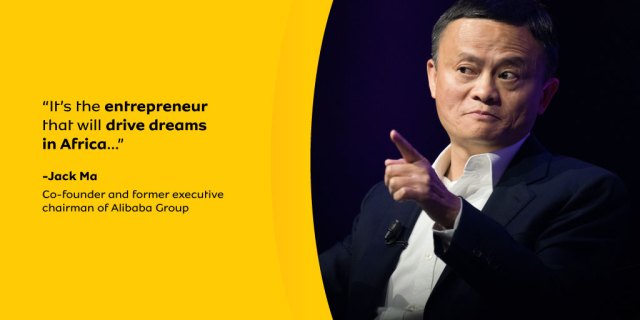
As connectivity improves throughout the continent, access to digital services and tools become more easily available. With a public API’s becoming accessible at a rapid pace, youth in Africa have more opportunities to create more digital solutions. Our API portal is currently used by 1000 young developers who want to improve or add to existing online solutions. When the youth code, they create jobs for those who cannot.
Consider all the roles involved in building an online store. A graphic designer and copy writer are both essential for a developer who wants to build an aesthetically pleasing and user-friendly website. Products need to be created to sell on the online store, providing an employment opportunity for those who can create. When products are ordered, they need to be delivered to customers, which produces an additional set of jobs involving logistics. One simple website can become the source of employment for many. Even those who aren’t considered tech-savvy.
The future of jobs has already begun, and as our digital world evolves, we are likely to see even more jobs in the future which we cannot imagine today. Technology and job creation certainly are good together!
When we travel unknown roads, a GPS app guides the way. When we are swamped at work, a virtual PA can turn a chaotic day into an organized one. When people who previously had no access to traditional banking can use a phone make financial transactions, financial planning becomes a reality. The rise of mobile money presents numerous opportunities for people in Africa, including the opportunity to save and plan for the future. Today, 6 million MTN Mobile Money users have opted in to make the best of this opportunity to save, in several important ways.
6 million MTN Mobile Money users have opted in to make the best of this opportunity to save.
Free education is not yet available throughout the continent, so many African parents are required to contribute to the cost of basic and secondary education. Tertiary education is often not a reality for those who complete high school. The Africa Report cites an alarming UNESCO statistic; 60% of children between the ages of 15 and 17 do not go to school. Mobile money enables parents to save for the education of their children, and to pay school fees every month in a safe and easy manner.
Nobody plans to fall ill or become injured, but such incidents happen every day. These incidents become infinitely more stressful when medical bills pile up or access to treatment isn’t possible without the immediate availability of funds. Access to mobile money opens up a world of financial solutions for people in Africa, including hospital insurance. The ability to get medical cover through a mobile phone is just one example of how financial inclusion is becoming a reality for Africans.
Technology has led to a number of medical breakthroughs. So many illnesses that used to cause death are now treatable, and more people are living to the age of 100 than ever before. In South Africa, most people cannot afford to retire or live solely on retirement income without an additional income. Regular saving through mobile money makes it more realistic for people in Africa to plan for retirement and less likely to rely on family members to get by.
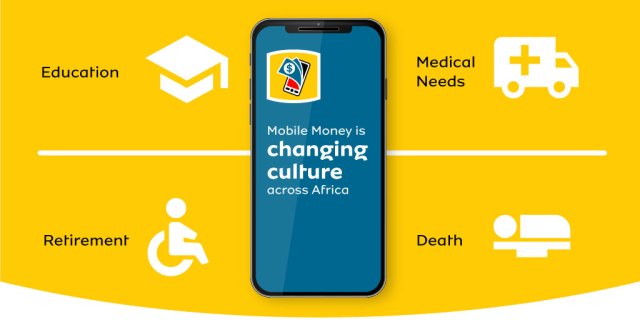
Princeton University, the Harvard School of Public Health, the University of Cape Town and the University of Chicago collaborated on a paper titled The Economic Consequences of Death in South Africa. The paper discusses how the death of an individual in an African household can have a major impact on those who are left behind. A death in a family can be the difference between food on the table and poverty, if that person is the sole breadwinner in the house. Mobile money offers users access to mobile life cover, so the financial head of a household can save funds to help the family in the event of his or her death. Funeral policies can also be taken out, so that the cost of saying goodbye doesn’t add to the heartbreak of losing a loved one.
A simple app, on a pocket-sized phone, can make a major difference to a lot of people. Not only does mobile money give African people an entry to the global economy, it gives African people the opportunity to plan for the future.
Good together is more than a catch phrase at MTN; it is a belief which forms the foundation for everything we do for the people we serve. What exactly makes Africa and MTN good together? We have launched a campaign to illustrate the answer to that question, starting with a TV commercial which highlights just how unstoppable the African spirit can be when our continent’s people are connected.
Take a look at the behind-the-scenes video below to find out what went into the making of the TV commercial, and the experiences had by those involved. Our Group General Manager, Victor Rakhale, explains that this is the first global positioning campaign we’ve created in close to 10 years, showing exactly what makes us different. TBWA/Hunt Lascaris produced the commercial and their Creative Director, George Low, acknowledges that while everyone knows what MTN does as a business, it isn’t always clear what kind of good that business does. The role our business plays in Africa’s health and education is essential for the delivery of a modern connected life. Connecting people is about more than putting technology in the hands of the African population; it is about transforming communities.
We live in an era where change is demanded. The digital world has played a big role in bringing the inequalities of the physical world to light. Thanks to technology, we are more aware of the state of different parts of the world than ever before. Technology eliminates the excuse of ignorance and provides us with some of the tools needed to address inequality. Consider the role technology can play in achieving the African Union’s 2063 Transformational Outcomes. The AU describes Agenda 2063 as Africa’s blueprint for transforming Africa into the global powerhouse of the future. Access to a connected world can make a positive impact on the achievement of these outcomes.
First on the agenda is an overall improvement in living standards for people in Africa. This includes reducing poverty and hunger, providing access to basic education and health, as well as access to basic requirements like safe drinking water and electricity.
The role technology plays here is one of job opportunities. A digital world provides a set of job opportunities and revenue streams which did not exist just a few years ago. With more youth coding for their futures (note: link to youth coding article) and taking an entrepreneurial path in their careers, more jobs are created for people living in Africa.
“When stories in the digital world lead to action in the physical world, it shows just how good people and technology can be together.”
Financial inclusion is necessary for a country’s economy to thrive. Without access to financial services, people cannot easily participate in the economy. The AU goal in this case includes the aim of ICT penetration contributing to GDP, at double the rate it did in 2013.
Mobile Money has proven itself to be the solution for financial inclusion in Africa. On our continent, people are more likely to have a cell phone than they are to have a traditional bank account. Mobile Money takes a digital approach to finance, filling the gap where traditional banking alienates millions of people in Africa.
 Integrated Africa
Integrated AfricaThe AU lists several desired outcomes in its aim for an integrated Africa. This includes free movement of goods and people on the continent, an increase in the volume of intra-African trade, upgraded transport and infrastructure as well as an improved education system.
As more areas within the continent become connected, goals such as this one become more realistic. Communication is already easier thanks to the popularity of mobile phones in Africa, which makes it more practical to move goods across the continent. As more Internet of Things solutions are deployed across the continent for various applications, more opportunities for efficiency and cost saving become apparent. With a reliable internet connection, building and deploying IoT solutions is a realistic (and profitable) way to solve challenges which are unique to Africa.
Technology provides us with a platform to share our stories, giving everyone who is connected a voice which the whole world can hear. The current state of the world is one where equality is no longer tolerated, and action can be taken to ensure that women, youth and children have a safe place in society.
Whether stories are produced by a journalist or by a person directly involved in it, that story has the potential to reach millions. The internet is a place where anyone can share their experiences, ask for help and do the research. When stories in the digital world lead to action in the physical world, it shows just how good people and technology can be together.
Perhaps the AU’s most detailed desired outcome for 2063, connectivity has a role to play in each part of it. This includes a 60% increase in local content in print and digital media, an increase in focus on the creative arts, and even the establishment of an African Space Agency.
While we provide coverage to over 560 million people in Africa, there is still so much room for growth. As we increase coverage in the regions where we operate, the opportunities to achieve these goals becomes much more realistic. Whether increasing digital media or taking African people to space, connectivity is imperative to achieving these goals.